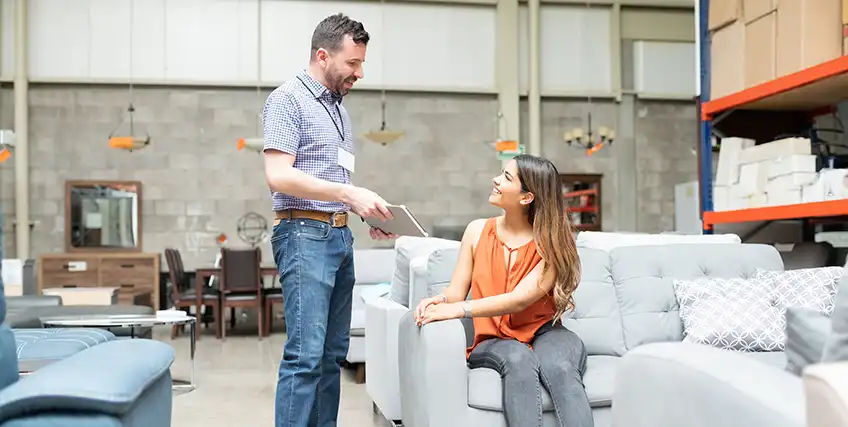Lease vs. Loan: Which Business Furniture Financing Option is Right for You?
March 06, 2025 | Last Updated on: March 10, 2025

Article Summary:
- Taking out an equipment loan or lease are two popular options to pay for business furniture.
- It’s important to know the differences between an equipment lease vs. loan before becoming a lessee or borrower.
- You may be able to get a loan from a finance company, bank, or online lender and a lease through specific vendors.
Business Furniture Financing: A Look at Equipment Lease vs. Loan
When you start a business, you need to secure the right space. That might mean looking at real estate options to find the right fit for your specific enterprise. Once that’s locked in, you’ll need to furnish your space. That can range from tables, chairs, and desks to cabinets, couches, shelves, storage, and more.
Buying all the furniture you need for your business can be far more costly than you expect. That’s especially true if you’re on a tight budget and your financial resources are allocated for more important things. But you can’t really work or invite customers into an empty space. There are two main options to consider for buying business furniture — an equipment lease and a loan. In this guide, we cover what to consider when comparing an equipment lease vs. loan to help you decide.
Comparing an Equipment Lease vs. Loan
Whether you’re opening a corporate office or warehouse, a retail store, or a new restaurant, you need to purchase furniture. It’s not a nice-to-have, it’s a necessity. You need furniture for your employees, customers, or clients to work or enjoy your services.
Furnishing your business space from scratch is a significant investment. The fact is many small business owners don’t have the cash on hand to pay the upfront costs. Two available financing solutions are equipment leasing and equipment financing. While both options can get you what you need, there are important distinctions you should know before deciding.
Look at Types of Leases
When comparing an equipment lease vs. loan, it’s important to be aware of the nuances of each. Equipment leasing companies may offer two different types of leases:
- Capital lease: The way a capital lease is structured is that you have the opportunity to buy the equipment by the end of the lease term. So basically, a type of lease-to-own financing. According to the Small Business Administration, with a capital lease you actually own the assets for accounting purposes, and it’s added to your balance sheet. Plus, you may be on the hook for maintenance. You may have higher monthly payments and need to pay taxes and insurance on the equipment, in this case furniture, that you buy. After the lease is up, you may have to pay for the outstanding amount for the equipment. What the amount is can vary based on the type of lease you have.
- Operating lease: Under an operating lease, the agreement is structured as more of a rent-to-use situation. Your payments are considered an operating expense. It has more flexible requirements and doesn’t come with the possibility of ownership down the line. Your lease payments may qualify as tax deductions, however it’s important to always clarify with a tax professional who can guide you on the ins and outs of what’s permissible.
A capital lease can be useful if you need financing and want to buy more time before you commit to owning. An operating lease is a good option to secure lower monthly payments and no commitment.
Review Cash Flow and Monthly Payments with Equipment Lease vs. Loan
One of the biggest things to consider when comparing an equipment lease vs. loan is how each will impact your cash flow with the monthly payments.
Equipment leasing may be more affordable in the short term but could actually be more costly in the long run compared to a loan.
Of course, your monthly payments for each type of financing depend a lot on your repayment term or lease period and the interest rates. Before choosing an option, consider your business goals and know how the upfront costs and monthly payments will affect your cash flow now and in the future.
One of the benefits of an equipment business loan is that by the end of your repayment term, you’ll have the furniture as an asset. If at some point you need to sell your items, you can get some return on your investment.
While used business furniture has some wear and tear and there will be depreciation to consider, you may get something back. When you lease equipment, you don’t have ownership over the furniture and therefore don’t have assets to sell.
Equipment Leasing for Business Furniture Pros and Cons
Equipment leasing pros:- Lower costs: Equipment leasing may have lower monthly payments compared to taking out a loan for business equipment like furniture. This can immediately help your cash flow so you can invest in your growth.
- No down payment: Since you’re not buying equipment, typically there is no down payment required. For cash-strapped businesses, this is a benefit when you compare an equipment lease vs. loan.
- No commitment: With an equipment lease, you’re paying for flexibility. You don’t need to make a major commitment and invest in expensive furniture.
- Pay more: Your total costs may be higher when leasing new equipment compared to buying it.
- No ownership: Depending on your finance agreement with the lessor, you as a lessee may need to return the furniture once the period is up. That means the money you’ve put in won’t turn into an asset you can keep.
- Limited options: When leasing equipment, you may face penalties if the furniture is no longer in good shape. Additionally, leases are notoriously hard to get out of and may come with steep penalties if you try to end the agreement early.
Equipment Loan to Buy Business Furniture Pros and Cons
Equipment loan pros:- Ownership: At the end of the loan term, you fully own the furniture. You don’t have to return the equipment or decide whether to renew it or not.
- Have a valuable asset: Financing equipment helps you pay for the cost of an asset over time. Lenders use the inherent value in the asset as a form of collateral. In this case, a lender could seize the furniture to recover loan costs if you default. This lowers the amount of risk a lender is taking on and can help your startup qualify for a loan to make equipment purchases. Down the line, you can also sell the assets if you need to and recoup some of your investment. This is a major benefit to consider when comparing an equipment lease vs. loan.
- Potential tax benefits: Your business furniture may qualify for certain deductions under Section 179, according to the Internal Revenue Service (IRS). Talk to a tax professional to discuss this further.
- Down payment requirements: You may need to put a 20% down payment to qualify for an equipment loan. Some lenders provide 100% financing, but some may have substantial down payment requirements.
- Higher monthly payments: While the total costs with an equipment loan may be lower, you may have higher monthly payments. This is because you’ll have ownership of the asset at the end of the loan term.
- Depreciation: You’ll have an asset once your equipment loan is paid off. However, like other assets, business furniture is subject to depreciation. So, if you try to sell it, it will be worth less and depending on trends, styles, and utility it could face obsolescence.
When deciding on whether you should take out an equipment lease vs. loan to buy business furniture, carefully consider these pros and cons. Think about your business needs at this moment in time and what makes the most sense.
Where to Get an Equipment Lease vs. Loan
Once you see the total purchase price for the furniture you need for your business, you may need to turn to an equipment loan or lease. After comparing an equipment lease vs. loan, you can choose the financing option that best suits your financial situation and business needs.
When you’re ready to move forward, you can get an equipment loan from:
- Traditional banks, credit unions, or online lenders: Through these different financial institutions and lenders, you may qualify for a term loan to help pay for your business furniture. Be aware the application process with a bank or credit union may have hoops to jump through and take longer than getting funding from an online lender.
- The Small Business Administration (SBA): You can specifically look at the SBA’s 7(a) loan program which allows you to buy furniture and fixtures.
These options are likely more cost-effective than racking up purchases on your credit cards. Do your due diligence by looking at reviews and comparing rates and loan terms.
If you want to move forward with an equipment lease, you can check out options from different finance companies and furniture manufacturers.
Final Thoughts
Whether you’re launching a new business or making big changes to an existing one, there are so many things to think about. Thinking about business furniture may take a back seat to some more important aspects.
However, the furniture you get for your office or retail location sets the tone for clients and customers. It also can be utilitarian and get the best work out of your employees or be a source of comfort and joy for your customers. Deciding whether to pursue an equipment lease vs. loan can be an important part of the equation to help your business come to life.
FAQs about Equipment Lease vs. Loan
If you’re weighing your options and considering an equipment lease vs. loan, here are some answers to frequently asked questions.
When Should You Get an Equipment Lease vs. Loan?
An equipment lease agreement may be preferable if you don’t have the funds for a down payment and if you’re unsure about keeping what you buy for the long term.
What Are the Disadvantages of An Equipment Lease vs. Loan?
Equipment leasing can be an easy solution to help you buy what you need. However, the downsides are that the lessor owns the equipment at the end of your term, and your total costs can be more compared to loan payments over the long term. A loan generally has down payment requirements and may have higher monthly payments.
Can Equipment Financing Be Used to Buy Business Furniture?
Equipment financing is a broad term that can be used for various types of equipment including business furniture. If you need to purchase a lot of furniture for a new office, you can compare an equipment lease vs. loan.
What is Equipment Financing?
Equipment financing refers to the various financing options available to help you purchase equipment. Many small business owners take out an equipment loan to buy the equipment outright. Others may turn to equipment leasing, which is more similar to a rental agreement, but business owners need to compare the benefits and drawbacks of an equipment lease vs. loan.
What Credit Score Do You Need to Get an Equipment Lease vs. Loan?
To qualify for an equipment loan, you typically need a minimum credit score of 600. An equipment lease may be available if you have a credit score of 550 or more. However, credit requirements differ by lender.
Can You Get a Loan to Purchase a Business?
If you need a loan to buy an existing business, you can check out small business acquisition loans. These may be available from various financial institutions and lenders.
Frequent searches leading to this page
Related Articles
Furnishing Your Future: How Furniture Loans Can Elevate Your Small Business
March 10, 2025
Lease vs. Loan: Which Business Furniture Financing Option is Right for You?
March 10, 2025
Why Business Furniture Financing is a Smart Investment for Your Growing Company
March 10, 2025




